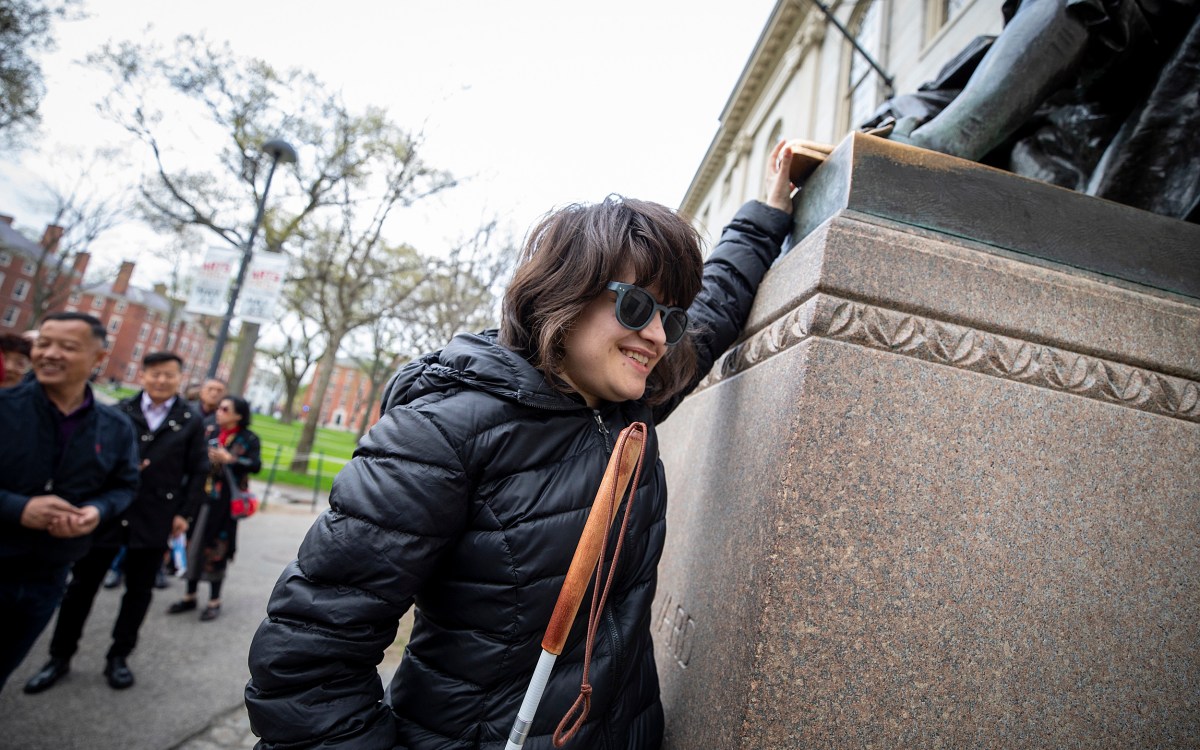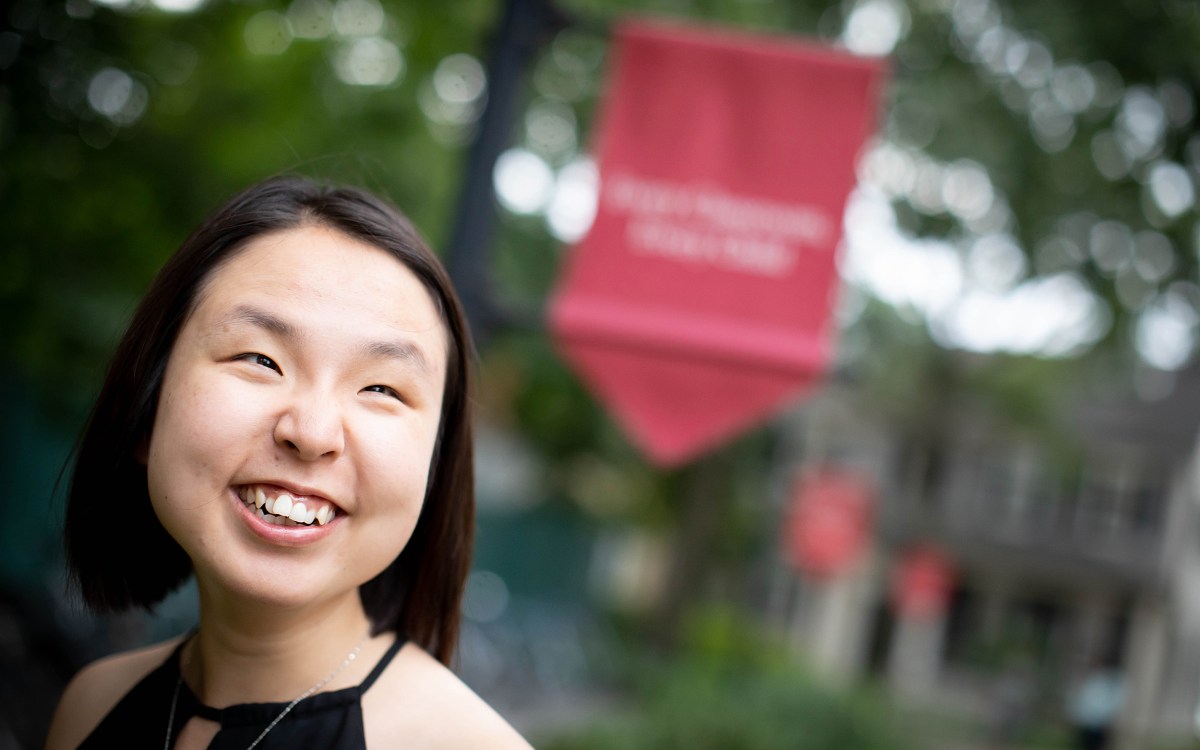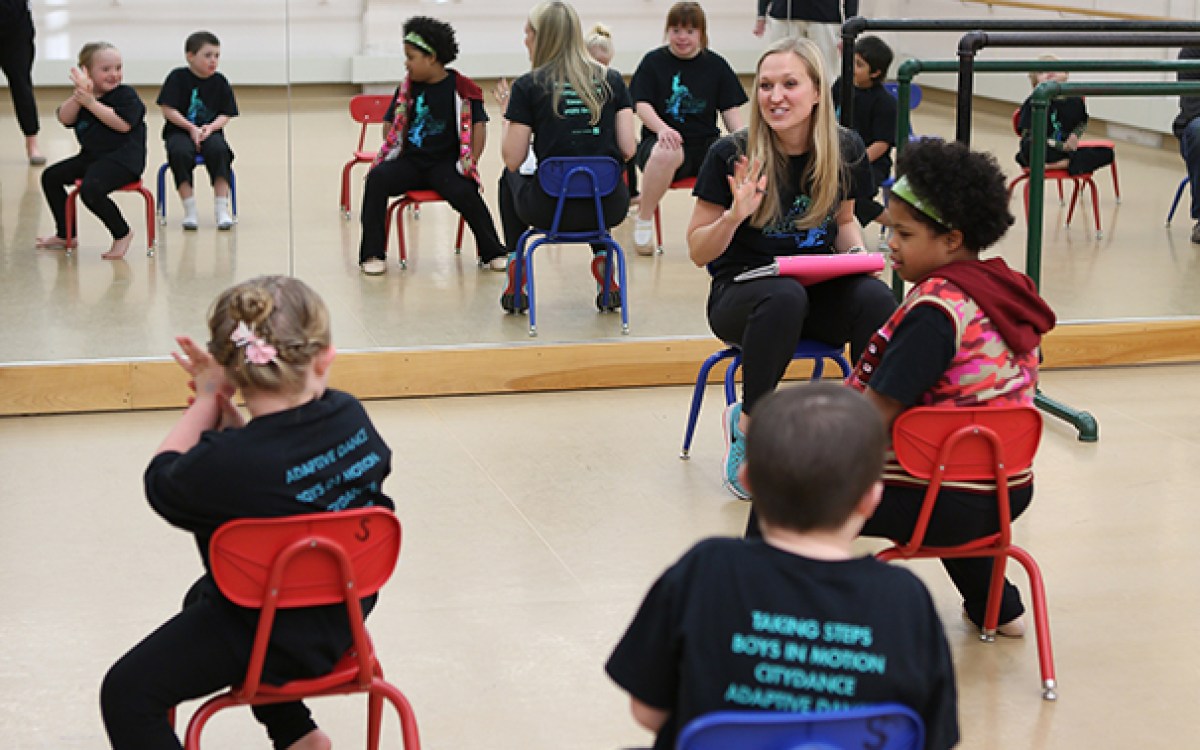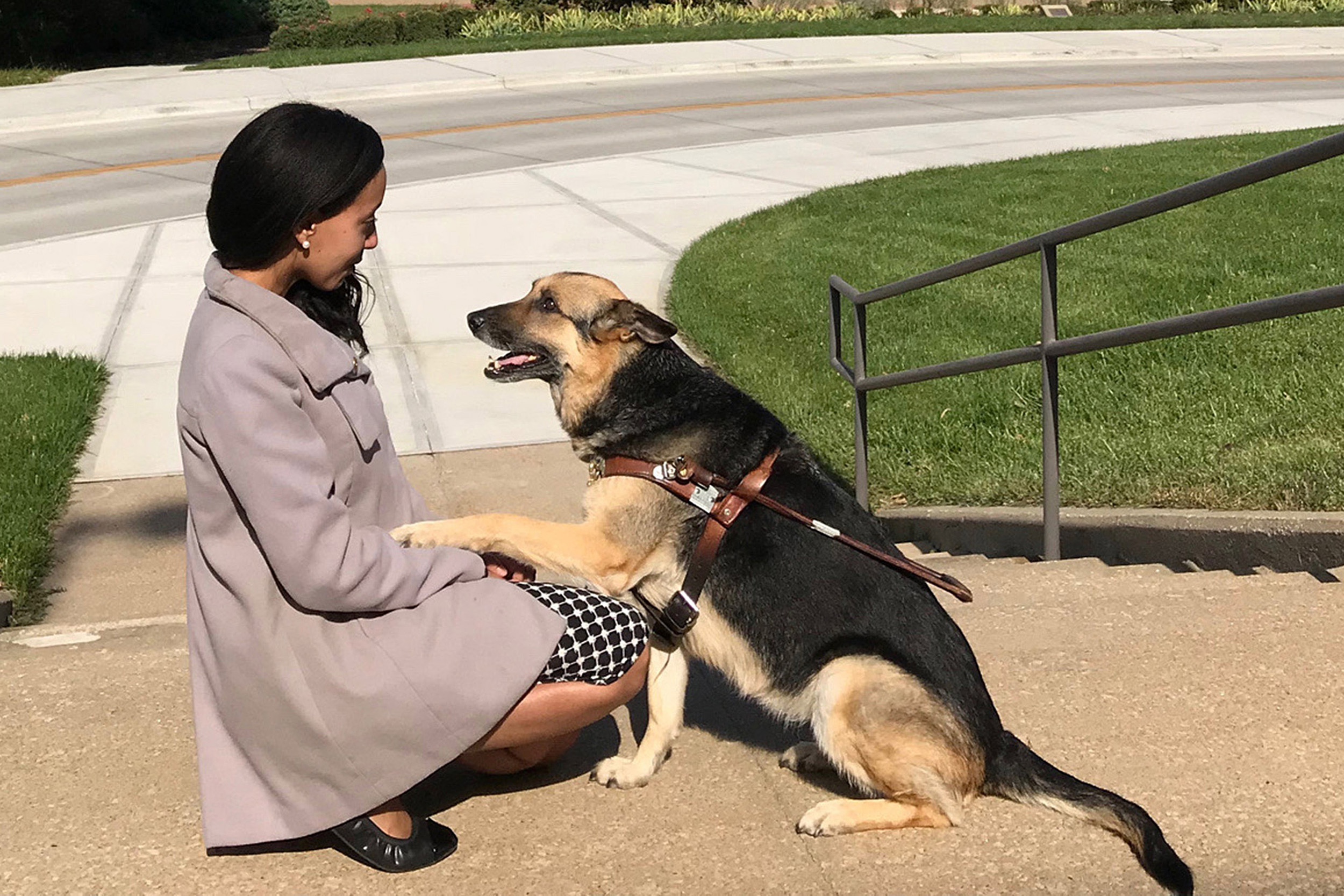
Haben Girma and her guide dog, Maxine, traveled all over the country to give talks on disability rights and inclusion. Here, they are pictured together at the University of Kansas.
Photo Courtesy of Girma Family Collection ©
One L, only harder
Figuring out Law School is grueling. Being deafblind doesn’t make it easier
The following is excerpted from Haben Girma’s new memoir “Haben: The Deafblind Woman Who Conquered Harvard Law.” More information on Haben and her memoir is available here.
“Can you hear me?”
The voice coming through my earbuds sounds scratchy. The earbuds connect to an FM receiver, part of an assistive listening device. Harvard Law School hired American Sign Language interpreters with voice transliteration skills to provide access to audio and visual information in my classes. Celia Michau and Erin Foley sit in the back of the classroom whispering into a microphone, which has a wireless connection with the receiver, so I can sit anywhere in the classroom. I prefer to sit in the back, though, just in case I need to communicate with the interpreters.
“[Mumble, mumble, static crackle.] How about now?” the voice asks.
I shrug, then shake my head no.
“Well, you’re responding, so you can kind of hear us, right?” Somewhere in front of me, the professor lectures us on contracts. Around him, seventy students sit in rows of desks facing forward. Using my voice would disrupt the class.
Turning to the back of the room, I lift my hands, then pause. To communicate through signs, I need to distill my ideas into my limited sign language vocabulary, or otherwise spell out all the words. I sign, “C-O-M-P-L-I-C-A-T-E-D.”
“It’s complicated? So you can hear us but it’s hard to hear us?”
I sign, “Right.”
“Okay. What can we do to help?”
“I don’t know,” I sign.
“The professor just looked at us. I think he was wondering if you raised your hand.”
My face grows hot. I make a mental note to keep my signing as low as possible.
“Do you want us to continue with class?” Nodding, I turn my chair to face the front.
“Okay, back to class. The defendant’s [mumble mumble].”
The lecture continues, and I strain to catch the words. Every way I listen, the words are gobbledygook. It’s not the volume — it’s turned to a high setting. It’s my hearing. My ever-decreasing, diminishing, disappointing hearing.
I’m twenty-two years old, and every year my hearing and vision have dimmed. The changes are gradual, until all of the sudden my old coping strategies no longer work. Since I wore sleep shades during blindness training, adjusting to my ongoing vision loss has been straightforward — I already have all the blindness skills. Adjusting to hearing loss feels more challenging. The inaccessibility of the hearing world constantly threatens to isolate me.
The voice in my ear says, “This is Celia. Maxine has four paws in the air.”
My shoulders shake. My fingers spell, “H-A H-A.” Reaching down for my guide dog, Maxine, I discover her stretched out. I give her a belly rub.
“Okay, the professor is writing on the board. Webb v. McGowin. When we return from our break I want us to [mumble mumble].”
Celia points to the door and fingerspells, “L-E-T-S T-A-L-K O-U-T-S-I-D-E.”
“Okay.” I grab the FM receiver, and the three of us huddle in the quiet hall.
“Can you hear me now?” Erin asks.
I smile. “Yes. It’s easier to hear you when you’re not whispering.”
“I bet. We’ve been trying to keep our voices down so that we don’t distract the other students.”
“I know. I don’t want you to distract them, either.”
We talk about possible causes but can’t come up with solid solutions.
“I turn on my braille computer and begin reading case notes. The sound of chattering students continues to bombard my ears. There’s laughter. More conversation. Laughter, again. My inner ear hears four devastating little words: you’re being left out.”
Erin takes the mic. “Before we go back in, I just wanted to let you know that this guy two rows in front of us has been texting under the table. He’s trying to be subtle. It’s hilarious. Every few minutes he looks down at his phone with this gleeful smile.”
“Who?” While I’ve been making a supreme effort to hear, other students have been sprinkling mini visual breaks throughout class. Maybe I should find a way to reduce classroom stress, too.
“I don’t know his name. I’ll let you know if I figure it out.”
The mic changes hands. “This is Celia. Just let us know if there is anything specific you’re curious about. Obviously we’re going to focus on the lecture, but if there are specific visual descriptions you want us to give you, just let us know.”
“I’m interested in social descriptions — the little details that create personality, the little quirks that make people human.”
“Yeah, that makes sense. Shall we go back in?”
We walk back in and take our seats.
I turn on my braille computer and begin reading case notes. The sound of chattering students continues to bombard my ears. There’s laughter. More conversation. Laughter, again. My inner ear hears four devastating little words: you’re being left out.
I pet Maxine.
A hand touches my arm. I turn. Celia slips her right hand under my left. She starts signing.
“Slow down.” My fingers probe her hand shapes as I drag sign language lessons out of the deep recesses of my memory. “L-I-Q-I-N Liqin I-S is … Sorry, I don’t know that sign. A-S-K-I-N-G asking … I’m sorry, I don’t know that one.” My face burns from embarrassment. “W-H-A-T Oh, right! I did know that sign. Sorry, go on. What … is your dog’s name, question mark.”
I look around. Someone is standing to the right of Celia.
Liqin. I address him. “My dog’s name is Maxine.”
Celia starts signing into my hands. Again, I voice as she signs. “How …” My eyebrows shoot up in exhausted confusion. “O-L-D old is M-A-X-I-N-E Maxine, question mark.” I turn to Liqin. “She’s three. I’ve had her since she was two. That’s when she graduated from guide dog school.”
Celia starts signing.
My brain feels fried. I can’t process any more sign language.
I give Celia an apologetic look, then lift my hands off hers. “Liqin, can I show you something?” When he stands by the table, I turn my braille computer so that the QWERTY keyboard faces him. “Type your question.” He says something. I point at the keyboard. “I can’t hear you, but if you type it I can read it.” He starts typing. “When you’re done, pass the computer back to me.”
He hands me the computer. I turn it around so that the braille faces me. My fingers glide over the line of text: how does this work?
“When you hit a key, pins pop up to form braille letters,” I respond aloud. “This is a braille computer called a BrailleNote. It’s basically a computer with a tactile screen instead of a visual screen.” I turn the computer around and push it toward him.
He types, then pushes the computer back to me. The text reads: This computer is very cool. Oh, I think class is starting now, TTYL.
I put my earbuds on. “Okay, class is starting. Who can tell me about [mumble mumble].”
My mind whirs with ideas. If I bring a wireless keyboard to class with me, then I could read as Liqin types, allowing me to respond in real-time. We wouldn’t have to pass the computer back and forth. Maybe, just maybe, other students would talk to me, too.
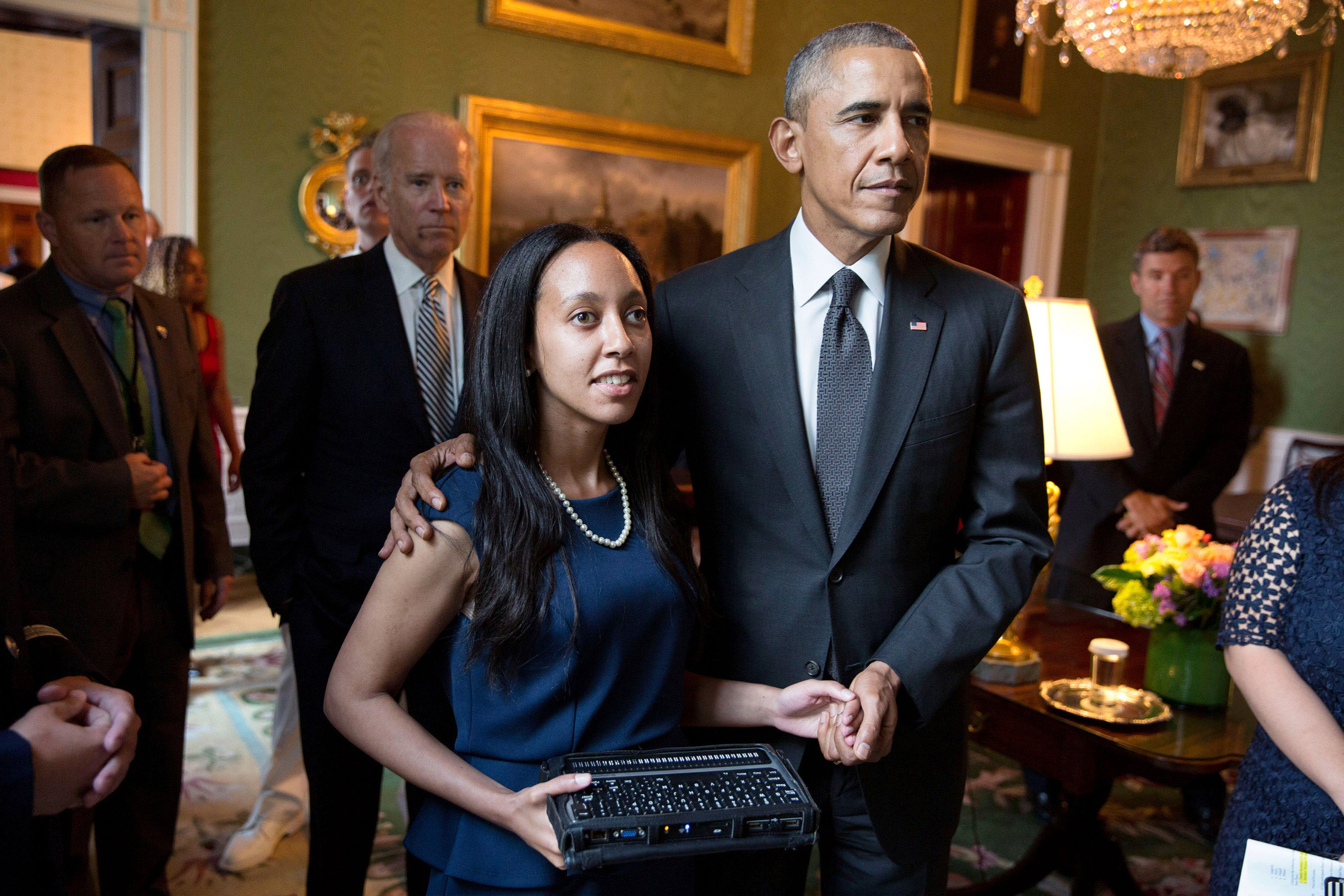
Haben Girma is guided by President Barack Obama through the Green Room in the White House, followed by Joe Biden. Girma holds her braille computer.
Photo by The White House/Pete Souza
Connecting with classmates and professors is important to me, but it’s not the only reason I moved from Oregon to Massachusetts. My personal experiences with discrimination, as well as those I heard from others, sparked my desire to develop legal advocacy skills. My pre-law advisor urged me to strive for the highest ranked school so I could gain access to the most employment opportunities. Even lawyers with disabilities face employment discrimination.
After I spent months crafting a competitive law school application, offers came pouring in. And then came the big one: Harvard Law School. Harvard offered me admission with a financial aid package that included grants and loans. Leaving the Best Coast for the East Coast didn’t appeal to me, but I knew I had to do everything in my power to increase my chances of becoming a successful lawyer. My parents supported the move, especially after I promised to return to California post-graduation.
In some ways, Harvard feels a lot like my other schools. The written word serves as my lifeline. The disability office works with professors to convert all written materials into an accessible format. Studying the reading materials and class notes has served me well in the past. I suspect it will work here, too. My biggest struggle will be finding a better way to communicate with classmates and professors.
My friend Gordon from Lewis and Clark College helped me pair a Bluetooth keyboard to my BrailleNote computer. The system works well.
The law school has scheduled a workshop to help students master the art of networking, and I want to try using my braille communication system at the workshop. I meet with staff members from Harvard’s disability and career-services offices to work out the details.
On the day of the workshop, Jody leads me to our reserved table right in the middle of the room. I place the braille computer and keyboard on a tall round table.
“Okay, let’s see,” Jody types. “I’m looking around the room. There’s a bar on the far left side of the room. Do you want a drink?”
I shake my head, no.
“Smart woman. Behind you there’s a table with two women chatting. Older, maybe in their fifties. To the left of them, there are two guys and one woman. They’re your age, so maybe students. Now they’re walking over to the bar.”
I clear my throat. “Do you think you could find people and bring them over?”
“Of course. Who do you want me to get?” I shrug. “Anyone.”
“Honey, that’s too vague. I’m here to support you, and I don’t want my opinions to color your interactions. Give me clear instructions.”
“Okay. Find someone who looks friendly.”
“Define friendly.”
I laugh nervously. “Let me think … see if you can spot someone who is smiling.”
“Okay, I’m on it. Oh, about fifteen feet to my right, your left, there’s a group of three guys. Well-dressed, in their thirties, maybe? They’re laughing and smiling about something. Want me to bring them over?”
“No!” My pulse starts racing. “I don’t want to interrupt anyone. Let’s avoid groups.”
“Okay, so we’re looking for smiling single people. Do you want me to tell you whether or not they’re wearing a ring?”
“Jody!” A laugh ripples from my core to my fingers and toes. My shoulders finally relax. “Yes, go ahead, tell me everything!”
“Of course. Everyone else gets to see all these details. It’s only fair that you get to know, too. If you want me to I can describe outfits, hairstyles, jewelry, facial expressions, you name it. You tell me what’s important to you and I’ll describe it.”
“Okay.” I flash her a delighted smile. “Do you see any people who are not in groups at the moment?”
“I’m looking … there’s a guy standing near the drinks. Forties, maybe, but I can’t see if he’s smiling from here.”
“Can you bring him over?”
“What do you want me to say?”
“You could say, ‘Hi, may I introduce you to Haben? She’d like to meet you.’ If he says yes, then explain to him, ‘She’s Deafblind and uses a keyboard and braille computer. Come on over and I’ll show you.’ You can gesture to the table.”
“Got it. BRB.” Jody walks off.
“People with disabilities get called inspiring so often, usually for the most insignificant things, that the word now feels like a euphemism for pity. Sometimes when a nondisabled person uses the word to describe a person with a disability, it’s a sign that they’re feeling overwhelmed or uncomfortable.”
My fingers find the keyboard on my computer. “You’re confident,” I type to myself. My fingers glide over the words, reading the message. Feel it. Think it. Believe it.
Two people approach the table. “It’s Jody. Simon came over to say hello. He doesn’t want to type, so I’m going to help him.” I extend my hand out to Simon. “It’s nice to meet you, Simon. My name is Haben.”
He shakes my hand, then holds it. I’m stuck reading with just one hand as he talks, and Jody types for him. “Tell her it’s a pleasure to meet her. What kind of dog is that? That’s a gorgeous dog. Does the dog go to class with her? It must be smart. Well it was very nice meeting you both. She’s very inspiring.”
I cringe inwardly. People with disabilities get called inspiring so often, usually for the most insignificant things, that the word now feels like a euphemism for pity. Sometimes when a nondisabled person uses the word to describe a person with a disability, it’s a sign that they’re feeling overwhelmed or uncomfortable.
“This is my card. It was very inspiring meeting her. Tell her she’s beautiful. You ladies take care.” He walks away.
“It’s just Jody now. I’m putting his card to the right of your computer. What did you think of that?”
“Hmm.” Chin resting on my hand, I pretend to think. “That was … inspiring.”
“Right?”
I nod, grinning. Coming into this event I was worried that something like this would happen. When a feared scenario actually occurs, its power weakens.
“Is there anything you want me to do differently next time?” Jody asks.
I shake my head. “Some people just won’t take me seriously. There are people out there who will treat me with respect, though. Let’s keep searching.”
“I see a woman walking around. Thirties, holding a drink in one hand. Kind of smiling.”
I nod. “Let’s meet her.”
Jody returns. “Haben, this is Sarah. She’s going to type.”
I extend a hand to Sarah. “Nice to meet you, Sarah.” She shakes my hand, then releases it.
“Hello,” she types.
I give her an encouraging smile. “How’s your evening going?”
“Good. Do I need to hit enter?”
I shake my head. “No need to hit enter. Everything you type comes through instantly. The letters come up in braille as soon as you press them.”
“Wow! Can I feel it?”
I turn the device around so that the braille display faces her. She touches the line of braille. When she’s done, I turn it back around to face me.
“That is so cool. Is this technology new?”
“This particular device came out this year, but there have been devices like this since the eighties. Do you work in tech?”
“Kind of. So, as you probably guessed, I’m a lawyer. I graduated from NYU Law five years ago.”
“Awesome! What kind of law do you practice?”
“We do business law. My firm has an office in downtown Boston, and we’ll be taking applications for summer associates soon. Are you interested?”
I take a moment to choose my words carefully. “That sounds like a great opportunity. I ultimately want to become a disability rights lawyer. Does anyone at your office handle civil rights cases?”
“I’ve done a few cases pro bono. I know someone else has, too. I want to give you my card so we can stay in touch. Do I give it to you or your interpreter?”
“Give it to me, please.” A card appears in my hand. “Thanks. I really enjoyed meeting you, Sarah. I hope you have a great evening.”
“You, too. Bye!” She picks up her drink and walks away. “It’s Jody. There’s a student waiting to talk to you. Sweet smile. He says he knows you. Here he is.”
‘Throughout my three years at Harvard Law School, I continue to face challenges. The school doesn’t know exactly which accommodations I need. Neither do I — doing law school Deafblind is new to me, too.”
“Hi, what’s your name?” I ask.
“Hey, it’s Liqin.”
“Liqin! Hi! How’s the reception going for you?” I’m smiling, thrilled to find a friend.
“I’ve met several interesting people, got some new business cards.” His words zip by, double the speed of the last typist. “I’d say it’s going pretty well. How about you?”
“I just had a nice conversation with a lawyer named Sarah. She was telling me about her firm’s summer program.”
“Awesome! I just wanted to say hi. There are only a few of us from our class at this event. BTW, the other day I was at the cafeteria and through the window I saw you playing ball with Maxine. It looked fun.”
“Yeah, she loves to play! You can play with her sometime, too.”
“Thanks, that would be great. I’ll email you. Okay, I’m going to go meet more people. See you around.”
“Bye!”
Jody continues to facilitate conversations throughout the evening. She types visual and audio descriptions, and then lets me make the decisions. I meet many people, both current law students and lawyers.
The experience energizes me, and I continue expanding my social circle. Classmates type on the keyboard before and after class; new acquaintances in coffee shops introduce themselves over the keys. On rare occasions people walk away, or make dismissive comments. I tell Maxine to steer around them. Most people are thoughtful, inquisitive, and willing to try having conversations in a new way.
Exploring my communication options only takes up a tiny fraction of my time, though. Most of my hours are spent reading textbooks, cases, and notes on those cases. The school sends me all my materials as digital files that I can access on my computer. Accessible documents, applications, and websites also allow me to conduct research and write papers.
Harvard instructors assign an extraordinary amount of homework. It’s daunting, but the work ethic I began to develop in middle school and honed throughout college serves me well now. I keep track of assignments, prioritize tasks, and seek advice from librarians, instructors, and experienced students. Both the Black Law Students and the Women Law Students associations save me during finals, offering mentors and study tips. Final exams are grueling. The law school provides me the exams in braille, and a laptop with a screen reader and braille display for me to type and print out answers. My exams, like all students’ exams, will be graded anonymously.
After my last exam, an email rises out of my inbox to torment me with an impossible question: would I like to celebrate the end of finals with my classmates at a bar? Yes, I would. No, I would not. Yes. No. Bars have sticky tables and stickier floors. Bars are loud, and I won’t hear anyone, and no one will hear me.
The time has come for me to learn how to handle bars. Lawyers have gathered in bars since time immemorial. I mean, the final test to become a lawyer is called a bar exam.
Dean of HLS Martha Minow hands Girma a diploma as she crosses the stage with Maxine at HLS’s graduation ceremony.
Photo Courtesy of Girma Family Collection ©
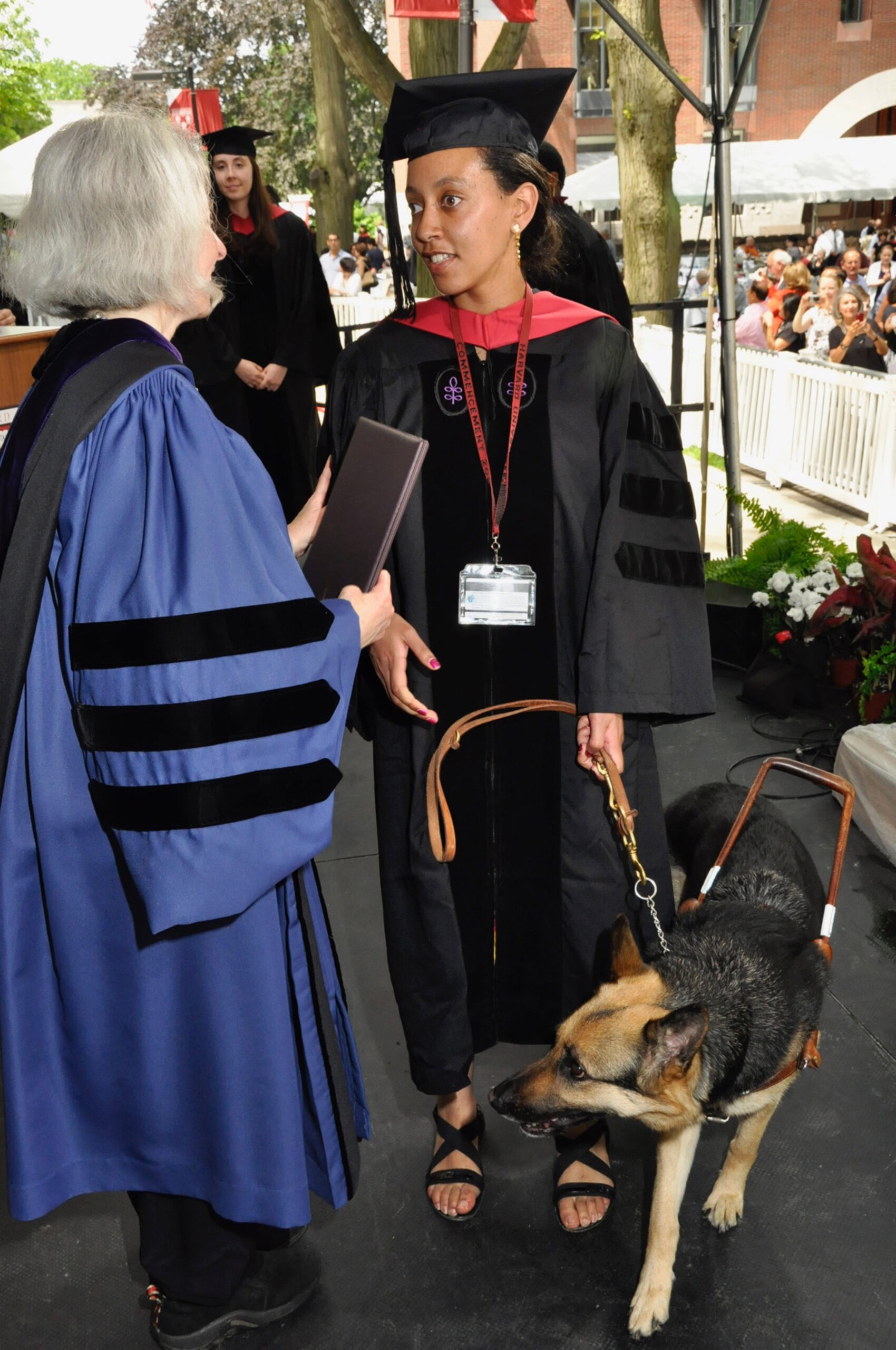
Maxine and I walk from our off-campus apartment to the law school, cross through the law school, navigate our way across Harvard Yard, traverse Harvard Square, and enter the legendary John Harvard’s Brewery & Ale House. The smells of beer and fried food greet us at the door. “Forward.” We descend the stairs. “Good girl!” She pauses at the bottom of the stairs as if to say, “Now what?”
Through the dim light I see a crowd of people all around us. To the front, to the left, to the right. The voices merge into one large cacophony of chaos.
A person approaches and touches my arm. She speaks, and her words fade into the noise.
“Hi!” I smile. “It’s hard for me to hear. I want to set up my keyboard. Would you show me to a counter or table I can use?”
She leads me through the crowd of people to the tall wood surface of the bar.
“Thank you!” I pull the keyboard and braille display out of my bag and pass the keyboard to her.
“Hey, it’s Janet. How are you?”
“Good! I’m relieved finals are over.”
“Me, too. We made it! We survived!”
“They say everything will be easier now that we’ve finished our first semester.” I feel giddy sitting here at a bar, sharing an ordinary conversation about school. Noisy settings always left me feeling lost and isolated in the past. I avoided them when I could — I skipped my high school’s prom and my college graduation ceremony. Things are going to be different now that I know there are people who will respect me and my keyboard.
“Do you want anything to drink?” Janet asks. I nod. “Lemonade.”
“Okay, I’ll tell the bartender. Liqin wants to say hi.” Janet talks with the bartender, then disappears into the crowd.
A tall guy takes the keyboard. “Hey, it’s Liqin. How did your finals go?”
“They were hard,” I say with a shrug. “But I gave it my best. How about you?”
“That contracts exam was intense. I’m glad it’s all over. I’m ready to go home for the holidays. Get away from HLS for a while. Your drink is here, just to your right.”
My right hand reaches out and finds the drink. I take a sip. “Is that lemonade?” he asks.
“Yes.” I raise my eyebrows, wondering if he is going to tease me about my drink choices.
“No alcohol? Don’t you want to celebrate?”
I smile. “I’m already Deafblind. I don’t want to be Deaf, blind, and drunk.”
“Hahahahahaha! That’s funny. Well, it’s your night to celebrate, too. Do you want anything else? Food?”
I shake my head.
The keyboard and braille display make hanging out at a bar easier than I expected. Throughout the evening, classmates come to appreciate how typing gives their vocal cords a break from shouting in the loud bar. My keyboard is like curb cuts on sidewalks in that nondisabled people find the accommodation useful, too. Disability solutions benefit the entire community.
After a while a tall person moves in front of the keyboard. “Hey it’s me.”
“Me who?” I ask.
“Oh rifgt sirry its Liqin I wsbt asj ig uiy meef aborjet dtomk.”
My fingers try to decipher the message. “What?” Gibberish.
If eyes can twinkle, mine are twinkling. “This is a tough question, a really hard question. How many drinks have you had?”
Gibberish.
“That’s what I thought.” I stifle a laugh.
A new person joins us. “Hey, it’s Nick. What’s up?” I gesture toward Liqin on the other side of Nick. “He was trying to say something. Would you ask what he wanted to tell me?” Nick turns to his left. Liqin leans into Nick’s ear. Nick leans into Liqin’s ear. Then Nick returns to the keyboard. “He’s asking if you need more lemonade?”
I point to my glass. “I actually haven’t finished mine. That was nice of him to ask, though.”
“His speech is pretty slurred.”
“I’m not surprised.” My face lights up with amusement. “He’s been typing gibberish.”
“Hahahaha! Hey, if there’s anything you want to talk about you should ask me now before my typing skills go, too.”
“Thanks!”
A little while later I decide to leave. “I’m heading out,” I tell Liqin. “Are you doing okay?” I place the keyboard in front of him.
Gibberish.
My eyebrows furrow. “Are you going to be able to get yourself home?”
Gibberish.
“I can walk with you. Your dorm is on my way home.”
Gibberish.
I laugh. “I’m sorry! What you’re typing isn’t making sense. But it’s much quieter outside. Tell me outside.” I pack up my communication system and put my coat on.
“Forward!” Maxine bolts for the stairs. As I follow her, I look back at Liqin. He lumbers along behind us. “Maxine, slow.” We keep pace with Liqin as he mounts the stairs. Maxine stops at the door. I pull it open, then wait for Liqin to go through.
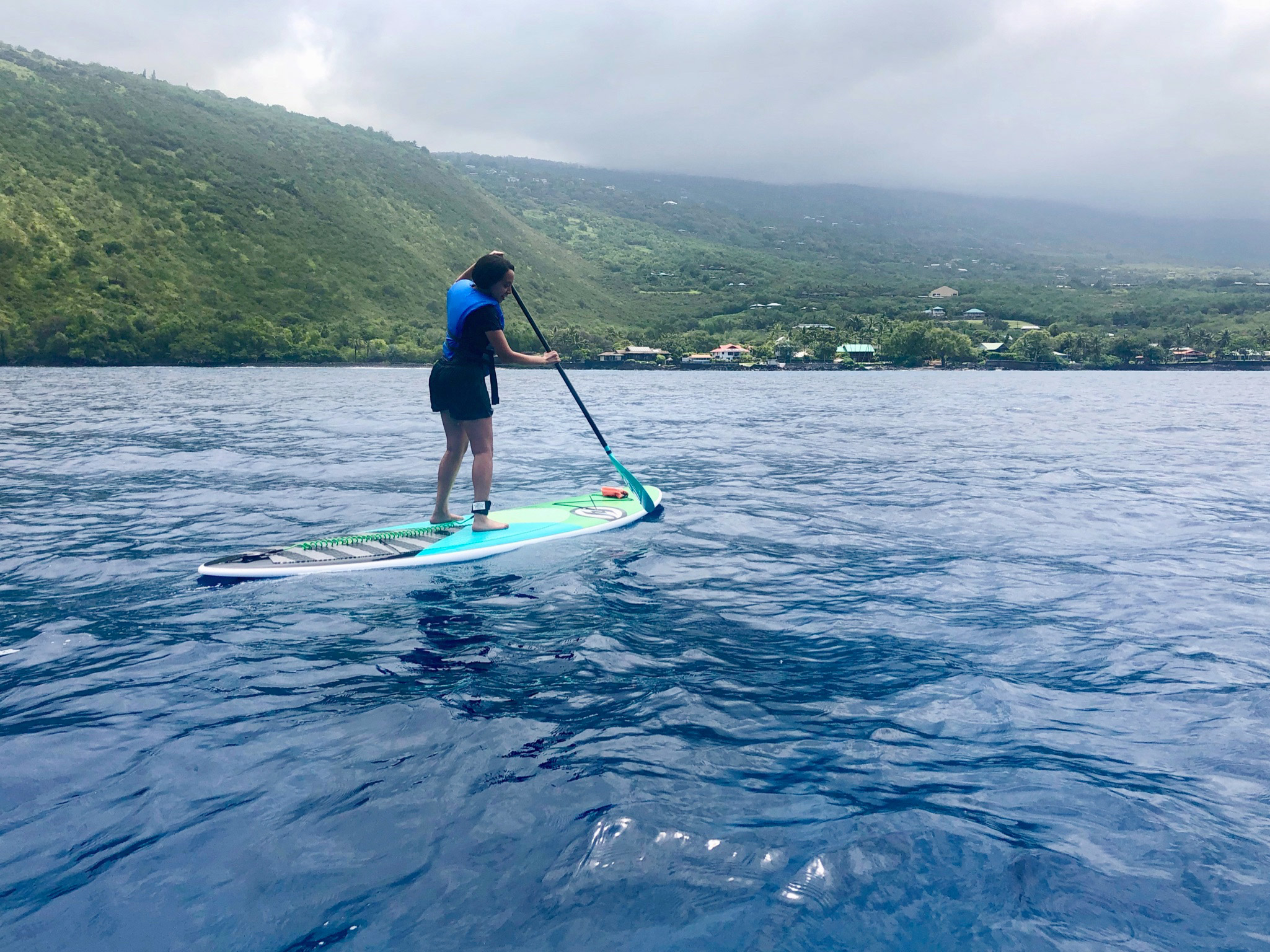
When not braving snowy winter evenings in Cambridge, Girma enjoys stand up paddling in warm water. Here, she is paddling in Kealakekua Bay, Hawaii.
Photo Courtesy of Girma Family Collection ©
The past days of warmer winter weather have cleared the Cambridge streets of slippery snow and ice. Lucky for the students out drinking — lucky for Liqin.
“What did you want to tell me?” I ask. Mumble, mumble.
I lean in closer. “What?” Mumble, mumble.
“Follow me.” Maxine and I reposition ourselves. “Maxine, forward. Good girl!” We walk down Dunster Street toward Harvard Square. Liqin stays behind us, muttering as he walks. He has a halting, zigzagging walk. Maxine and I slow down to match his speed.
The sidewalk widens into the open plaza of Harvard Square. Halfway across the square, Liqin turns right, shuffling off in the wrong direction.
Maxine and I hurry after him. When we catch up, I tug at his arm. “Your dorm is the other way.”
No response.
“Maxine and I are going left.” I point to the left. “Maxine?” he asks.
As Maxine moves, Liqin follows. The three of us walk together through Harvard Square. Soon we enter Harvard Yard, Maxine strides through with confidence, picking out the right path.
Liqin shambles off the path.
“Liqin!” I call after him. Maxine and I catch up. “Would it help you if you hold my arm?” I lift his left hand and put it around my right elbow.
Mumble, mumble. His hand drops to his side.
“Can you try to stay with us? Follow Maxine, okay?” Mumble, mumble.
Liqin follows Maxine through Harvard Yard, and Maxine and I drop him off at his dorm, safe and sound. That was my plan, anyway.
In actuality, what happens is this: Liqin follows Maxine through Harvard Yard, around the Science Center, and along the Langdell Law Library. Then he stops, catapults up the library steps, and sits.
A surprised laugh escapes my mouth. I gaze at the silhouette on the stairs, wondering what to do.
“My first semester of law school bestowed many valuable lessons, and the most memorable one is this: hold off on the drinks in case a friend needs help getting home.”
This is the guy who reached across the unknowns of disability — the technology, the interpreters, the watchful dog — to start a conversation with me. Now our roles have reversed. This time I’m the one reaching into the unknown. How on Earth will I get him to come down and go home?
Maxine and I mount the steps. I sit down beside Liqin and adopt an upbeat tone. “It’s Haben and Maxine. I have some good news. You finished your finals.”
Mumble, mumble.
“You’re done. You’re free. You don’t have to live in the library.”
Mumble, mumble.
“You’re really close to your dorm. Don’t you want to go home?”
Mumble, mumble.
I feel stuck — stuck on these cold, hard stairs, stuck outside on this wintry night. I run my hands through Maxine’s fur, trying to warm them. Liqin starts petting her, too. That gives me an idea.
“Maxine is heading that way. Come on.” I stand up and address Maxine. “Are you ready to go?” Maxine and I descend the stairs, but Liqin remains seated. I wait at the bottom, hoping he’ll come down on his own.
He hollers, “Maxine!”
I address my dog again, talking loud enough for Liqin to hear. “Maxine, are you ready to go?” The whole harness shakes as she wags her tail. Maxine and I start walking. Behind us, Liqin finally gets up, clambers down the stairs, and makes the short trek from the library to his dorm. Maxine and I travel another block to our apartment off campus.
My first semester of law school bestowed many valuable lessons, and the most memorable one is this: hold off on the drinks in case a friend needs help getting home.
I’m the first Deafblind student at Harvard Law School. Harvard excluded many groups throughout its history. When Helen Keller was applying for college, Harvard wouldn’t admit her. Back in those days, Harvard only admitted men. Harvard’s sister school, Radcliffe College, offered Helen Keller admission, and she received her degree in 1904.
The Harvard community chose to exclude women for the first two hundred-plus years of its existence. Over time, the culture shifted. Adapted. Changed. Harvard eventually opened its doors to women, people of color, and people with disabilities.
Harvard has come a long way since Helen’s time, and there is still more work to do.
Throughout my three years at Harvard Law School, I continue to face challenges. The school doesn’t know exactly which accommodations I need. Neither do I — doing law school Deafblind is new to me, too. We engage in an interactive process. We try different strategies, one after another, until we find the right solutions. I pass all my classes, even earning several honors. In my final year I’m honored with a Skadden Fellowship, one of the most prestigious fellowships in the legal field. The Skadden Foundation will provide two years of financial support for my work to increase access to digital reading services for blind students. I’ll be working at Disability Rights Advocates, a nonprofit law firm in Berkeley, California.
No more cold, snowy winters for us. “Maxine, are you ready to go?”



